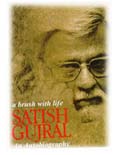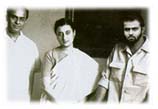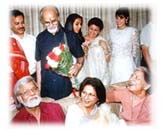The Rediff Special/Satish Gujral
'Inder realised that such disregard for others is manifested by people who suddenly breathe the intoxicating draughts of absolute power'
 The renowned painter on his brother Inder and his road to the prime ministership
via his association with the Nehru dynasty.
The renowned painter on his brother Inder and his road to the prime ministership
via his association with the Nehru dynasty.
Inder's journey to the prime ministership could be said to have begun
when he became close to Indira Gandhi after the death of her father.
This was partly due to the fact that when other
ambitious politicians began to desert her and switch their loyalties
to Prime Minister Lal Bahadur Shastri, Inder stood by her. She
sensed he was a man she could trust. When her father's body was
being bathed prior to its cremation, she asked Inder to stand
guard and prevent intruders from entering the room.
Shastriji had included Indira Gandhi in his cabinet
as minister of information and broadcasting. She felt claustrophobic
under the tension of working for a prime minister who wanted to
keep his eye constantly on her lest she became too popular. At
one time she seriously contemplated resigning and taking to art.
On one of her visits to our house she consulted me about the aspects
of painting as a vocation.
The fact that she did not quit the cabinet
was due to the persuasion of three friends in whom she confided:
Dinesh Singh, Inder and Romesh Thapar. How long she could have
remained part of the Shastri regime is difficult to gauge. Then
came the news of Shastri's sudden death at Tashkent in the early
hours of 11 January 1966.
Immediately after the shocking news was broadcast, Indira Gandhi
rang up Inder, Romesh Thapar and Dinesh Singh and invited them
over for breakfast next morning. Before the three went to her
home, they spoke to each other on the phone and agreed that they
should persuade her to contest the succession.
 The night before the swearing-in she asked Inder, Dinesh and Uma
Shankar Dikshit, an old family friend, to help her draw up a list
of potential cabinet ministers. She had to accommodate most of
Shastri's appointees. Regional and religious considerations had
to be taken into account. Confabulations went on till midnight.
Members of the conclave were asked to return early in the morning
to accompany Indira Gandhi to Rashtrapati Bhavan.
The night before the swearing-in she asked Inder, Dinesh and Uma
Shankar Dikshit, an old family friend, to help her draw up a list
of potential cabinet ministers. She had to accommodate most of
Shastri's appointees. Regional and religious considerations had
to be taken into account. Confabulations went on till midnight.
Members of the conclave were asked to return early in the morning
to accompany Indira Gandhi to Rashtrapati Bhavan.
Next morning, as expected, Inder arrived at Indira Gandhi's residence.
He was in for a rude shock. An aide handed him the typed list
of the proposed Cabinet. It had all the names that Inder had helped
to screen the previous night, with one single exception: Inder
Kumar Gujral. His eyes went up and down the list looking for his
name. It had been there the night before, it was not there in
the morning.
While Inder was still scanning the list in utter
disbelief, Mrs Gandhi emerged in the hallway. She was dressed
in her best and was all smiles. Dinesh Singh and Dikshit were
with her. She noticed Inder going over the list. For a fleeting
moment they looked into each other's eyes -- a moment that was to
remain frozen in Inder's memory for years to come. There was a
chilling ruthlessness in her gaze. Such callous contempt for friends
who had stood by her and had provided constant support through
thick and thin was something he could not understand. She did
not bother to explain. Inder realised that such disregard for
others is manifested by people who suddenly breathe the intoxicating
draughts of absolute power; they feel they owe no explanations
to anyone.
 Mrs Gandhi may have had good reason to cut her minister and friends
down to size if she felt they were overstepping the limits she
had set for them. But she went beyond that. In public she belittled
people she had herself befriended. She was forever suspecting
her old allies of conspiring against her. After she had successfully
humiliated Dinesh, she regarded everyone who went to meet him
as her enemy.
Mrs Gandhi may have had good reason to cut her minister and friends
down to size if she felt they were overstepping the limits she
had set for them. But she went beyond that. In public she belittled
people she had herself befriended. She was forever suspecting
her old allies of conspiring against her. After she had successfully
humiliated Dinesh, she regarded everyone who went to meet him
as her enemy.
Since Inder continued seeing Dinesh after the latter had incurred
her displeasure, she convinced herself that Inder was part of
Dinesh's conspiracy to topple her. She gave Inder a clear indication
of her growing suspicions when she reshuffled her Cabinet. She
threw Dinesh out and took the important portfolio of information
and broadcasting away from Inder, giving him the less glamorous
housing ministry instead. This was followed by her insistence
that Inder should ensure that Dinesh was evicted from the ministerial
bungalow allotted to him. Inder's delay in complying with her
wishes only confirmed her suspicions about his loyalty.
'Not one to be easily provoked, Inder calmly told Sanjay to control his abusive tongue'
Excerpted from A brush with life, by Satish Gujral, Viking, Rs 695, with the publisher's permission.
Tell us what you think of this feature
|